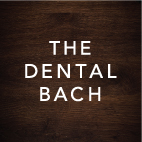Dental Crowns
Crowns, sometimes known as caps, are similar to ceramic veneers but are like a thimble helmet that covers the whole tooth and not only strengthens it but can also change the shape and colour.
They may be placed on teeth that still have their nerve or ones that have had root canal treatment and so have no nerve. Crowns may be made of various materials such as gold, ceramic, metal or porcelain over a metal base. This will depend on the condition of the tooth, position in the mouth and need for strength.
Receiving a dental crown will often involve two appointment visits to The Dental Bach.
Firstly your tooth will be prepared and a detailed impression mould will be taken. A temporary crown may be placed while your permanent crown is being crafted in a dental laboratory where it’s also colour matched to your other teeth, or a new whiter colour created.
At your second appointment your temporary crown, if one was used, is replaced by your permanent crown. It is checked for fit and comfort before being permanently secured, restoring your smile and bite.
Bridges | filling the void
Spaces left by missing teeth can lead to teeth on either side of the space rotating or shifting out of alignment and into the empty space, resulting in a bad bite, wear of remaining teeth and possible joint damage.
Dental bridges from The Dental Bach are a fixed replacement to fill such a space, usually where only one or two teeth are missing. Like a bridge over water, they need supports at either end of the space, so the teeth either side of the space usually have a crown placed on them. Artificial teeth/tooth are then attached to these crowns, spanning and filling the space left by the missing teeth/tooth.
Like a crown, receiving a bridge will often involve two appointments with the The Dental Bach team. Firstly, the teeth on either side of the space are carefully prepared and a detailed impression mould is made. This is the template used by a dental laboratory to create your bridge. A temporary bridge is placed whilst the permanent bridge is made.
Approximately two weeks later at your next appointment, your bridge is checked for fit and comfort before being bonded securely into place.
Bridges can last for many years, but as they are supported by natural teeth and gums, it’s important to maintain a good oral hygiene routine and schedule regular check-up appointments with The Dental Bach to monitor their status.

